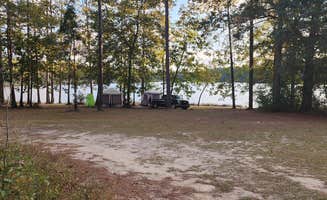Dispersed camping options around Vernon, Florida provide affordable alternatives for outdoor enthusiasts looking to explore northwest Florida's panhandle region. The area features a mix of freshwater access points along the Choctawhatchee River system with dense pine forests creating natural buffers between camping areas. Summer temperatures regularly exceed 90°F with high humidity, making spring and fall the preferred camping seasons for most visitors.
What to do
Fishing access points: Geneva State Lake offers multiple fishing docks where campers can catch bass and bream without needing a boat. A visitor noted, "There are 2 hiking trails - more like atv trails that go to either side of the lake from the campground."
Water recreation: Caryville Public Boat Ramp provides direct river access for kayaking and canoeing, though camping has significant restrictions including no fires, alcohol, pets, or generators. The site functions primarily as a launch point rather than a traditional camping destination.
Wildlife observation: The surrounding forest areas contain diverse wildlife including white-tailed deer, wild turkey, and numerous bird species. The quieter camping areas away from motorized trails offer better wildlife viewing opportunities, particularly at dawn and dusk.
What campers like
Sunrise views: Early risers at Geneva State Lake appreciate the morning scenery. One camper shared, "It was gorgeous especially for sunrise. Wish I could have stayed longer but I didn't want to get stuck there in the rain."
Budget-friendly options: Free and low-cost camping near Vernon, Florida appeals to travelers on tight budgets. A recent visitor mentioned, "$5 a day and there is a QR code on the board to pay, or you can by an annual pass for $40 if you plan on staying at least 9 days it's worth it."
Site maintenance: Despite being primitive camping, some locations receive regular upkeep. As one camper observed about Geneva State Lake, "Also appreciated the free trash cleanup, clean porta potties and picnic tables. No fire rings really but you can tell where people burn campfires."
What you should know
Road conditions: Access to some dispersed sites requires traveling on unpaved roads that can become challenging in wet weather. A visitor to Geneva State Lake cautioned, "It was about 5 miles of dirt roads to get in there and they were well maintained but I didn't want to risk it [in the rain]."
Limited facilities: Most free camping near Vernon requires complete self-sufficiency. While some locations have portable toilets, campers should plan to bring all necessary supplies including drinking water, toilet paper, and waste disposal bags.
Payment systems: Some camping areas have transitioned to digital payment methods. As one reviewer explained, "The camping price is $2 per night, no reservation is needed, and is online payment."
Tips for camping with families
Safety preparations: Families should bring comprehensive first aid kits as medical facilities are distant from most camping areas. Cell service can be spotty, so consider bringing two-way radios for communication within your group.
Recreation planning: Bring fishing equipment, as fishing is consistently rated a top activity for families at lakes near Vernon. While organized recreational facilities are minimal, the natural environment provides opportunities for nature exploration and wildlife spotting.
Weather considerations: Summer thunderstorms develop quickly in this region, especially during afternoon hours. Plan indoor vehicle activities for children during these regular weather events, which typically pass within 1-2 hours.
Tips from RVers
Site leveling: RV campers at Geneva State Lake should bring additional leveling blocks. A camper reported, "I drive a 20' van - so non level is ok for me but these sites were not level." Most dispersed sites lack formal pads or leveling areas.
Size limitations: Larger RVs face significant challenges at most dispersed sites near Vernon. Access roads often have tight turns, low-hanging branches, and soft shoulders that can be problematic for vehicles over 25 feet.
Power management: With no hookups available, RV campers must rely on batteries and generators where permitted. Solar panels are increasingly popular for extended stays, though tree cover at many sites limits their effectiveness to 4-6 hours daily.


